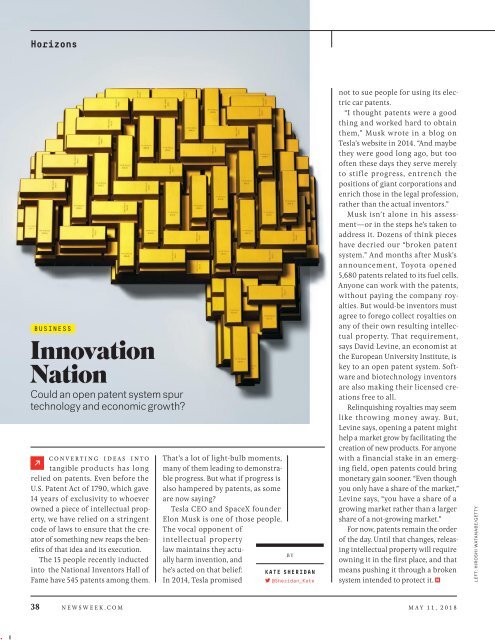You also want an ePaper? Increase the reach of your titles
YUMPU automatically turns print PDFs into web optimized ePapers that Google loves.
Horizons<br />
BUSINESS<br />
Innovation<br />
Nation<br />
Could an open patent system spur<br />
technology and economic growth?<br />
converting ideas into<br />
tangible products has long<br />
relied on patents. Even before the<br />
U.S. Patent Act of 1790, which gave<br />
14 years of exclusivity to whoever<br />
owned a piece of intellectual property,<br />
we have relied on a stringent<br />
code of laws to ensure that the creator<br />
of something new reaps the benefits<br />
of that idea and its execution.<br />
The 15 people recently inducted<br />
into the National Inventors Hall of<br />
Fame have 545 patents among them.<br />
That’s a lot of light-bulb moments,<br />
many of them leading to demonstrable<br />
progress. But what if progress is<br />
also hampered by patents, as some<br />
are now saying?<br />
Tesla CEO and SpaceX founder<br />
Elon Musk is one of those people.<br />
The vocal opponent of<br />
intellectual property<br />
law maintains they actually<br />
harm invention, and<br />
he’s acted on that belief:<br />
In 2014, Tesla promised<br />
B Y<br />
KATE SHERIDAN<br />
@Sheridan_Kate<br />
not to sue people for using its electric<br />
car patents.<br />
“I thought patents were a good<br />
thing and worked hard to obtain<br />
them,” Musk wrote in a blog on<br />
Tesla’s website in 2014. “And maybe<br />
they were good long ago, but too<br />
often these days they serve merely<br />
to stifle progress, entrench the<br />
positions of giant corporations and<br />
enrich those in the legal profession,<br />
rather than the actual inventors.”<br />
Musk isn’t alone in his assessment—or<br />
in the steps he’s taken to<br />
address it. Dozens of think pieces<br />
have decried our “broken patent<br />
system.” And months after Musk’s<br />
announcement, Toyota opened<br />
5,680 patents related to its fuel cells.<br />
Anyone can work with the patents,<br />
without paying the company royalties.<br />
But would-be inventors must<br />
agree to forego collect royalties on<br />
any of their own resulting intellectual<br />
property. That requirement,<br />
says David Levine, an economist at<br />
the European University Institute, is<br />
key to an open patent system. Software<br />
and biotechnology inventors<br />
are also making their licensed creations<br />
free to all.<br />
Relinquishing royalties may seem<br />
like throwing money away. But,<br />
Levine says, opening a patent might<br />
help a market grow by facilitating the<br />
creation of new products. For anyone<br />
with a financial stake in an emerging<br />
field, open patents could bring<br />
monetary gain sooner. “Even though<br />
you only have a share of the market,”<br />
Levine says, “you have a share of a<br />
growing market rather than a larger<br />
share of a not-growing market.”<br />
For now, patents remain the order<br />
of the day. Until that changes, releasing<br />
intellectual property will require<br />
owning it in the first place, and that<br />
means pushing it through a broken<br />
system intended to protect it.<br />
LEFT: HIROSHI WATANABE/GETTY<br />
38 NEWSWEEK.COM MAY 11, 2018


